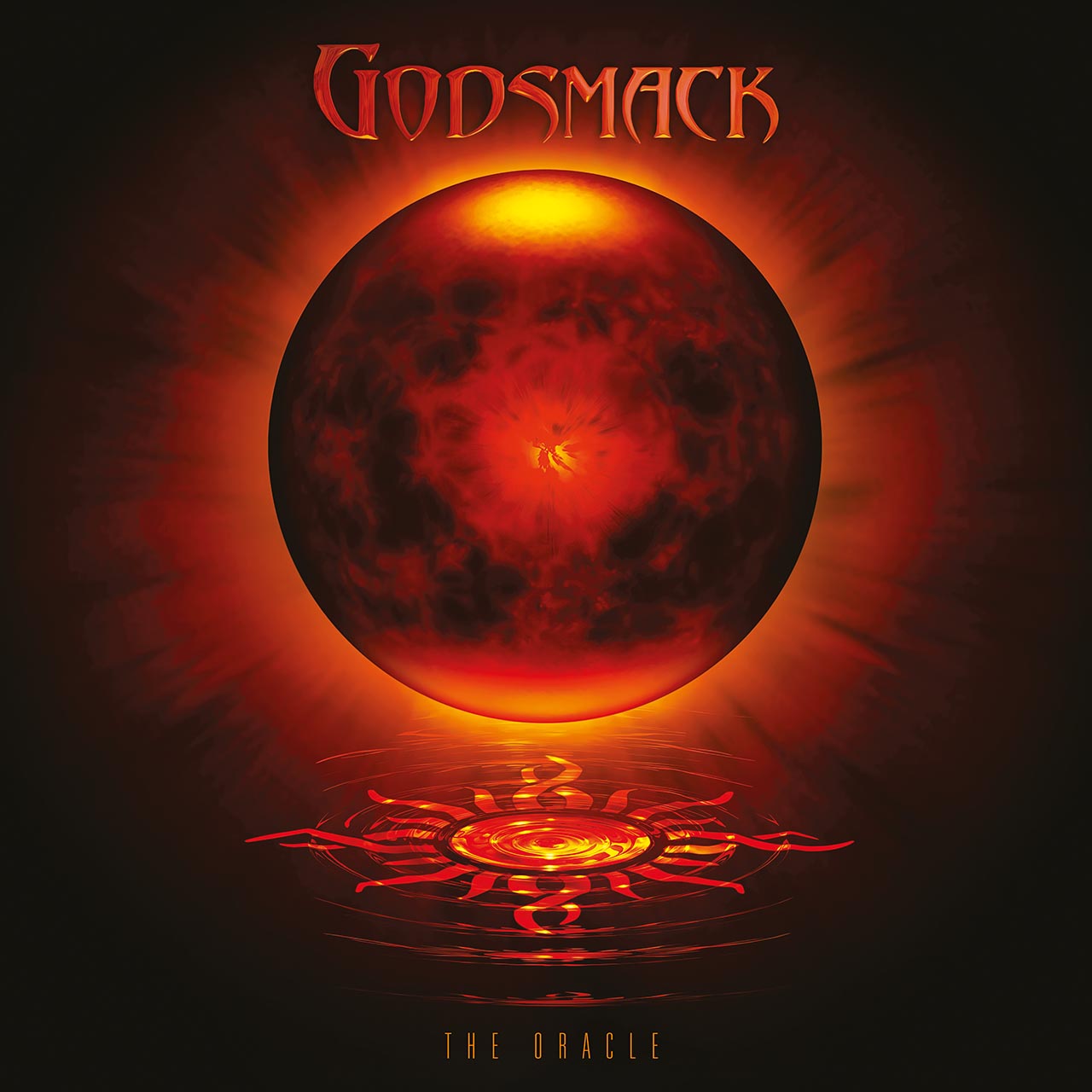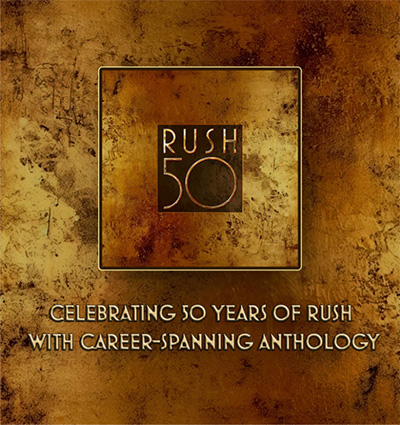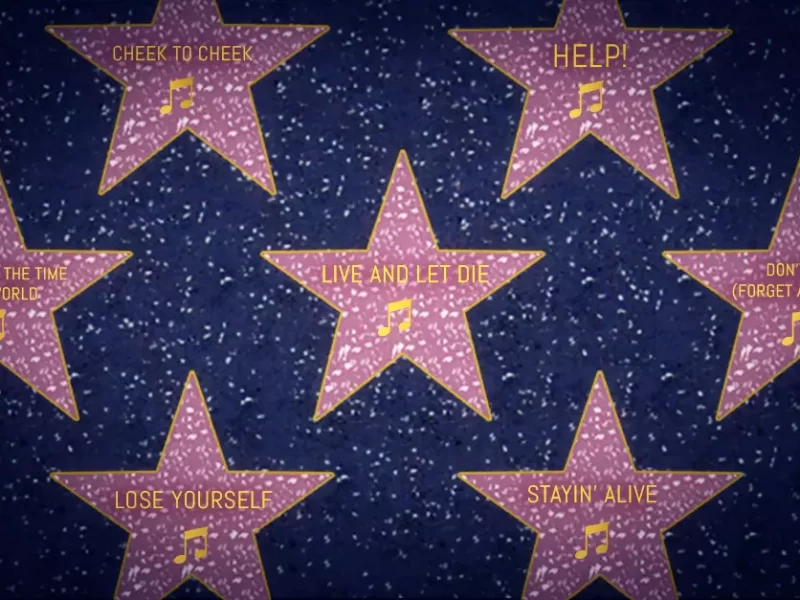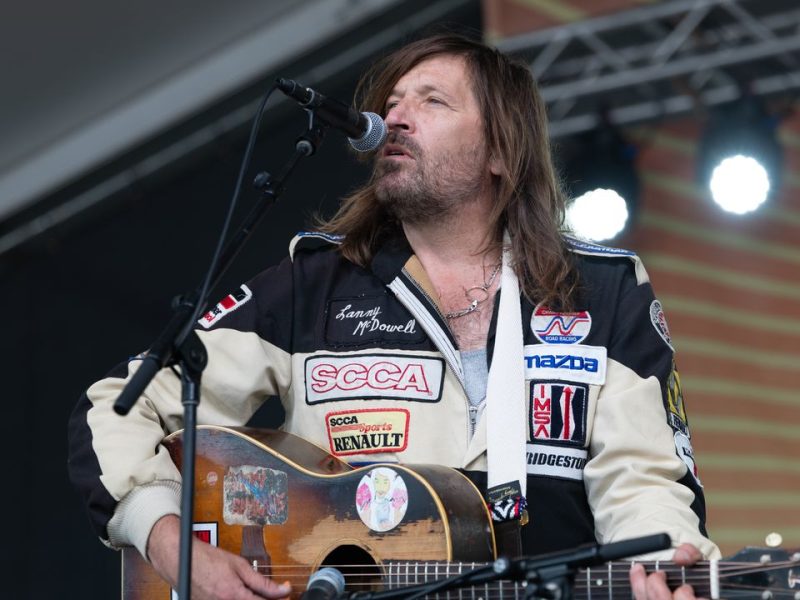Robbie Merrill has provided the low-end for heavy rock icons Godsmack for decades. Formed in 1995, the Boston-based band released their independent debut album All Wound Up… in 1997, before the following year’s self-titled album gave them a massive breakthrough, going five times Platinum in the US alone. They’ve released a further seven albums since, all reaching the US Top 20, while their hit singles include “Voodoo,” “I Stand Alone,” and “Bulletproof.” With a vinyl reissue of 2010 fan favorite album The Oracle available now, uDiscover took the chance to talk to Merrill about his life in music, the gear he can’t live without, and the secrets behind Godsmack’s powerful live sound.
Order Godsmack’s The Oracle on vinyl now.
EARLY DAYS
What first attracted you to the bass?
My dad played guitar and my uncle played the bass, so I always watched them play. Then I moved to a new town when I was probably 13 years old, and I had a neighbor who played guitar and was starting a band. He had a drummer and needed a bass player, so I traded my train set for a bass.
Were you a fast learner?
I played by ear and thought I was good, but I really wasn’t. At that time, I was playing Rush and Led Zeppelin, and my dad told me, if I wanted to make a living at it, I had to be versatile. So I got into a country band, then a ’50s and ’60s covers band – that’s where I really learned what music was about, because I did everything by ear. Then I’d take a couple of lessons, and then as I’m playing live, I’m going, OK, now I know where a major seventh is, or a minor chord. I would work it out from hearing the notes. And then, over the years, I just studied and played with all kinds of cats from Berklee School of Music. I just kept going. I was playing in a wedding band and making great money. But then I ended up joining an original band and that’s where I got hooked, that’s where I became broke! It took me years and years, I went through so many different bands.
How did you form Godsmack?
Then when I met up with Sully in 1995, we started just jamming. I knew he was a really good drummer. I’d seen him play with Strip Mind and thought, “Wow, if you can do that out front, I’m in.”
Were there any bassists who you especially looked up to?
Victor Wooten (Béla Fleck & The Flecktones, SMV) was the big one. I saw him play and I went, Oh my God. That’s why I started playing in Godsmack – because I wasn’t going near that talent [laughs]. Another one was Will Lee, who’s a great bassist, he was a session guy who played with everybody then went on to be in the house band on The Late Show With David Letterman. And at the time I was listening to people like Joe Satriani and all those instrumental bands.
What benefits are there to playing left-handed but being right-handed?
I was born with a defect to my left hand which limits the use of the middle finger. So I put my bass upside down, restrung it, and started playing lefty. It definitely makes my sound unique. I’m learning from the other side of my brain. I had discussions with Tye Zamora, who played in Alien Ant Farm and was my bass tech for a while. He graduated from Berklee, top of his class – at the time, I was like, “What the hell am I doing? He’s gonna be listening to me every night!” But we talked about that stuff – it makes your playing smarter because you’re working both sides of your brain. When I listen to music, it’s as a fan, not a musician – I don’t know it. I have to strap the bass on and then it comes naturally. And then when I do play, everything is very compartmentalized into sections – even with Godsmack stuff, I’ll be playing the verse and I won’t know the chorus until it comes along and then I just play it, it’s crazy.
GEAR
What picks do you use to give your playing such a distinctive sound?
I have two fingers I use to pick and I’m very anal with it. But the hand that I pick with is crooked, so my index finger and ring finger hit other strings, which doesn’t sound consistent. Then in 2003, I started playing with Dunlop D finger picks, so now I can play with both fingers at the same time and they sound the same. They make my fingers sound a little bit more like a pick, so they cut through more on stage. I always played with my fingers and I’d really dig in, so when I put the picks on, at first I thought, no way, because I couldn’t feel the string. But then I got used to it and it got to a point where I always wear them. On our Vibez tour last year, where we played some acoustic songs, I wasn’t going to play with my picks, but then me and the sound engineer listened back to the tape, and we’re like, “oh yeah, it just cuts through better.”
What have been your basses of choice over the years?
My first real lefty bass was a Fender Precision which I got in 1981, I still have it. I think I recorded the very first Godsmack demo, which is basically the first record, with it. I also had an Ibanez that I had bought in 1988 and I played live with that early on. Actually, I was playing that bass in our first video, “Whatever.”
An Ibanez rep saw that video and he called me up. Then I was using Ibanez basses for a while, until our sound guy Frank Sgambelone introduced me to Spector. We were playing with Metallica in 2004 and when we showed up in Maryland, there were a couple of Spectors sitting there backstage. I picked them up and I went, “No way.” They were really heavy. Also, I’m always a bolt-on guy and these things were neck through. I plugged it in and started playing, and I’m like, “Holy shit!” Metallica’s sound guy was leaving, and when he heard the bass he came back down. He goes, “What’s up with the bass?!” I bought two of them right there and then.
I was with them up until last year. I was up in Canada and Dingwall showed up with a couple of lefties. I knew a bit about them because I’ve been using Darkglass Electronics’ Tone Capsule preamp since about 2017. I really love the mid-low, mid-high thing that Darkglass have, because a lot of the time, your treble can be hissy and I hate that. So Dingwall use those in their pick-ups. They sound just like Darkglass, because you can go active or passive. I haven’t played passive in forever and wanted a change, so I got a couple of those basses and I’ve been playing those since. I wasn’t really looking to change bass companies, it just fascinated me, how good they sounded, because of the fanned frets the low strings are longer and the tension is tighter. So when you’re playing in low keys, like I play in drop C, you don’t get that wobble – the tone is exactly what I’ve been looking for.
What kind of strings do you prefer to use?
I was a D’Addario guy, even before I was signed. Then over the years, if I had a new bass tech, if they had a guy at a string company, they would call them up and use their strings. I just knew that I had 45-`105s and for my drop C, I used 110s. Then when I switched to Dingwall, I needed extra-long strings, and the only company that does that with the gauge is D’Addario. So I actually called him up a couple weeks ago and said, “Listen, I lost touch with you guys and I’m in a pickle. I need some strings and I’m willing to buy them.” And they set me up with them.
GODSMACK – IN THE STUDIO AND LIVE
You’re known for your creative and melodic basslines, where do they come in the writing and recording process?
In the beginning, Sully always said to me and Tony, “Listen, I know you guys can play, but play for the song.” Godsmack usually record drums and guitars first, then bass. So I get a scratch vocal track when I’m working out my part and I go from there. Often Sully’s lyrics will inspire me, like on “Love-Hate-Sex-Pain” [from The Oracle] – I was playing around, listening to what Sully was singing and responding to it. I usually start off really simple and then if it calls for something more complicated, like “One Rainy Day” [from Godsmack IV, 2006], I really go for it. We only played that one when we recorded it in the studio, then when we did it on the Vibez tour last year I had to go back and relearn it. I’m like, “Wow, what the hell was I doing?” It was really good! But a lot of it’s right there on the fly.
Godsmack has had some great drummers over the years, what has your relationship been like with Sully, Tommy Stewart and Shannon Larkin?
I’ve always just locked in with the kick, the push and pull. If they run a click track in the studio, I don’t want to hear it. I’ve tried but can’t do it, I’ll just follow the drummer. Live, Shannon and I are real tight, I lock in with the kick and the snare and the hi-hat – that’s pretty much it.
You make it sound so simple!
Yeah, it’s that human connection and chemistry you develop over the years. And the way that Sully writes stuff on the drums, if you close your eyes and listen to it, even though it’s just the drums, you can hear the riff on the guitar. And then he pushes and pulls on purpose. He doesn’t care if people think he has a shitty meter, it’s got nothing to do with that. The mood of the song depends on that pushing and pulling and if it stays on the click, it doesn’t work. When we drag stuff, we do it on purpose. People will say to me, “You guys dragged the chorus of ‘Awake’” – yeah, we fucking do it on purpose, every time, every night.
How important is it to you that you have a great live sound?
If I ever saw a big band in a big arena, my complaint always was, “You can’t hear the fucking bass.” And then when we’d play big rooms, I’d say to my engineer, “Did you hear my mistakes? Well, if not, you’re not fucking doing it right!” I want you to hear my mistakes.
Since I got into the big arenas, I’ve become a student of the sound, and have been asking, “How do I get this bass to translate in the big room? How do I get the best tone and not fuck it up?” I always talk with my bass tech and my monitor engineer. We wear in-ears and I try to give him my tones. I have three channels, one using the preamps because I like the pick-ups. Then one with a little bit of dirt, and another one that’s all dirt, and then I just have them blended. And then out front, the mixing engineer has the opportunity to use all three. That distortion channel doesn’t sound good by itself, but when you mix them all together in a big room, it has that clarity I’m looking for.
Order Godsmack’s The Oracle on vinyl now.





